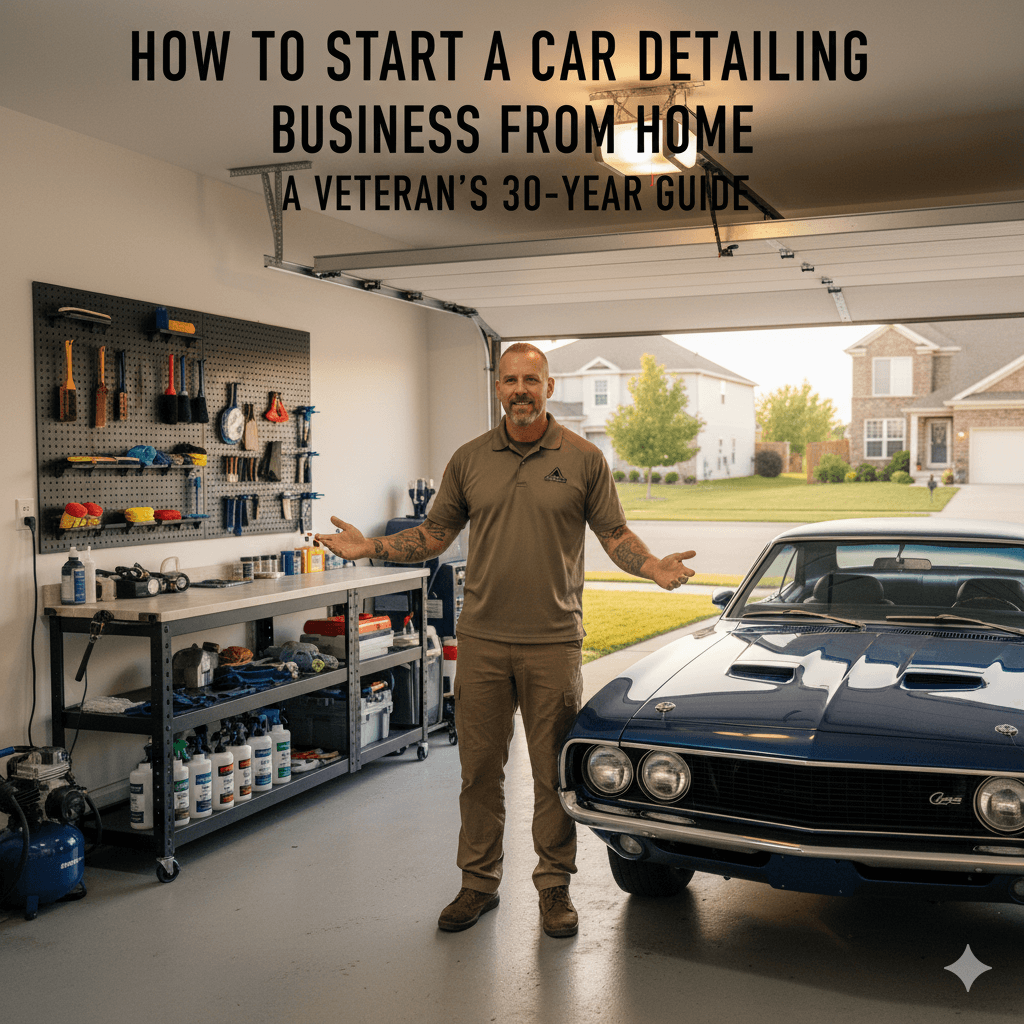
When I first got into car detailing back in the late 80s, I never imagined people would one day run detailing businesses from their garages, basements, or even driveways. Back then, if you wanted to make money in detailing, you needed a shop, a sign out front, and a whole lot of word-of-mouth hustle.
Fast forward to today—and it’s a different ball game. Thanks to portable equipment, eco-friendly products, and online marketing, you can now launch a profitable detailing business from the comfort of your home.
But here’s the truth: starting a car detailing business from home is not just about buckets and soap. It’s about building trust, managing logistics, and turning your passion for clean cars into a real, sustainable income.
In this guide, I’ll walk you through everything I’ve learned over 30+ years of detailing—from scrubbing rusty pickups to polishing brand-new Teslas—and show you exactly how to set up a detailing business from home that can grow into something much bigger.
Why Starting from Home Makes Sense
- Low overhead costs – No rent, no shop lease.
- Flexibility – You set the hours and pace.
- Scalability – Start small and expand when ready.
- Convenience – You work where you live.
During the 90s, I knew a guy named Rick who detailed cars out of his mom’s garage. He started with a $200 vacuum, some old rags, and a lot of elbow grease. Ten years later, he owned a 6-bay detailing shop with a waiting list of customers.
That’s the beauty of this industry—you can start small and grow big.
Step 1: Understand the Business Side First
Car detailing is more than just cleaning cars. It’s about:
- Customer satisfaction
- Repeat business
- Smart marketing
- Efficient systems
If you treat it like a hobby, you’ll make hobby money. If you treat it like a business, you can make six figures.
Step 2: Set Up Your Home Detailing Workspace
Here’s what you need to consider:
Space
- A garage or a covered driveway works best.
- Keep neighbors in mind (noise and water runoff can be an issue).
Power & Water
- Access to electrical outlets.
- A water source or waterless detailing products.
Ventilation
If you’re working with chemicals in a garage, proper airflow is a must.
Step 3: Get the Essential Equipment
You don’t need everything at once, but here’s the starter kit:
- Pressure washer or waterless wash system
- Vacuum cleaner (wet/dry)
- Dual-action polisher
- Microfiber towels (lots of them)
- Buckets with grit guards
- Brushes for wheels, vents, and upholstery
- Chemicals – shampoo, wax, sealant, interior cleaner, tire shine
Pro Tip: Don’t cheap out on towels. Bad towels = scratches, and scratches = angry customers.
Step 4: Learn the Craft Like a Pro
Detailing is an art as much as a science. Customers expect you to know:
- How to safely wash without scratching paint.
- When to use wax vs ceramic coating.
- How to remove swirl marks.
- How to clean leather without cracking it.
When I was starting, I practiced on my old ’89 Ford pickup. It had scratches, faded paint, and a coffee-stained interior. Perfect practice ground.
Step 5: Build a Menu of Services
Keep it simple when you’re starting out:
Basic Package ($80–$120)
- Exterior wash
- Interior vacuum
- Windows, wheels, and tires
Premium Package ($150–$250)
- Full interior shampoo
- Wax/sealant
- Tire and trim dressing
Specialty Services (High-Ticket)
- Ceramic coating ($500–$1,200)
- Paint correction ($300–$800)
- Headlight restoration ($80–$150)
Step 6: Set Your Pricing Right
One of the biggest mistakes I see? Undervaluing your work.
Remember:
- You’re not just selling “cleaning.”
- You’re protecting a $20,000–$80,000 investment.
- Customers will pay for peace of mind.
Step 7: Market Yourself from Day One
Even if you’re working out of your garage, people need to know you exist.
Old-School Marketing That Still Works:
- Business cards at local auto shops.
- Word-of-mouth from family and friends.
- Flyers at gas stations and car washes.
Modern Marketing Must-Haves:
- A Google Business Profile.
- A simple website with before/after photos.
- Social media (Instagram is gold for detailing).
- Online reviews (ask every happy customer).
Step 8: Legal, Insurance & Safety Stuff
Don’t skip this part—it’s important.
- Business license (check your local city/county rules).
- Liability insurance – one scratch on a BMW and you’ll thank me.
- Environmental rules – some areas don’t allow runoff water.
Step 9: Master Customer Service
Cars are personal. They’re tied to people’s identities and memories. I’ve detailed cars for dads who wanted their minivans spotless before family trips, and for collectors who treated their 60s Mustangs like children.
If you treat each car like your own, you’ll have customers for life.
Step 10: Plan for Growth
Starting from home is just the beginning. Once you’ve built a base:
- Expand into mobile detailing.
- Hire helpers.
- Rent a shop.
- Offer fleet services (dealerships, rental companies).
Key Takeaways
✅ Start small with a home setup and basic tools.
✅ Build a clear menu of services and price fairly.
✅ Market online and offline from the start.
✅ Protect yourself with insurance and proper licenses.
✅ Focus on customer service—it’s your best marketing.
FAQs
1. How much does it cost to start a car detailing business from home?
Usually between $2,000–$10,000 for basic equipment and supplies.
2. Can I really make money detailing cars from home?
Yes. Part-time detailers make $1,000–$3,000/month. Full-time pros can scale to $70k–$100k/year.
3. Do I need a garage to start?
Not necessarily, but a covered space helps with weather and professionalism.
4. Is car detailing seasonal?
In cold climates, yes. Many detailers offer winter services like salt removal.
5. How do I get my first customers?
Friends, neighbors, and social media are the best starting points.
Conclusion
I’ve seen this industry evolve over decades—from wax-on, wax-off in the 80s to ceramic coatings and mobile apps today. And here’s the truth: you don’t need a fancy shop or a huge budget to succeed.
Some of the best detailers I know started in their driveways. They hustled, treated customers right, and grew one clean car at a time.
So if you’re wondering how to start a car detailing business from home—start small, start smart, and start now. The sooner you grab that bucket and polisher, the sooner you’ll build something lasting.

